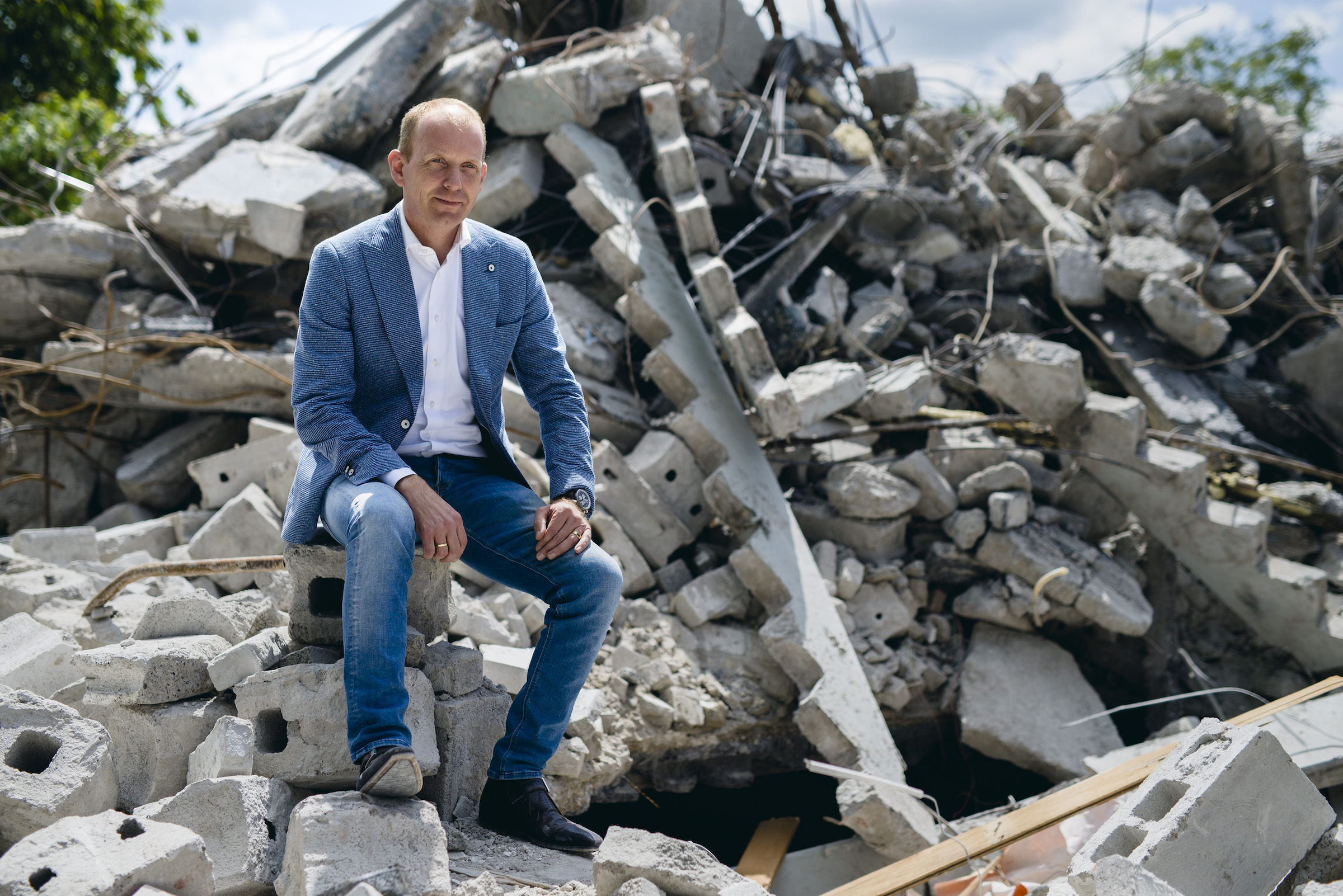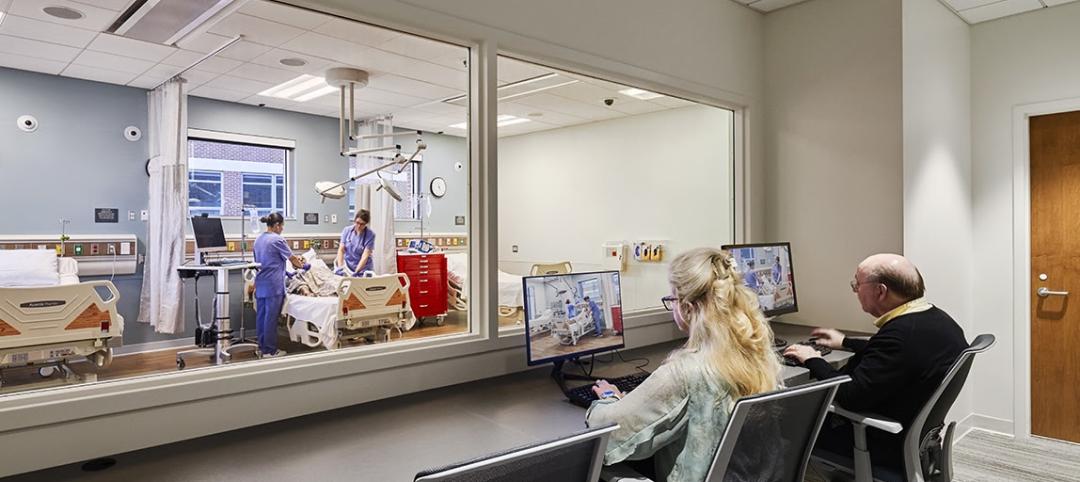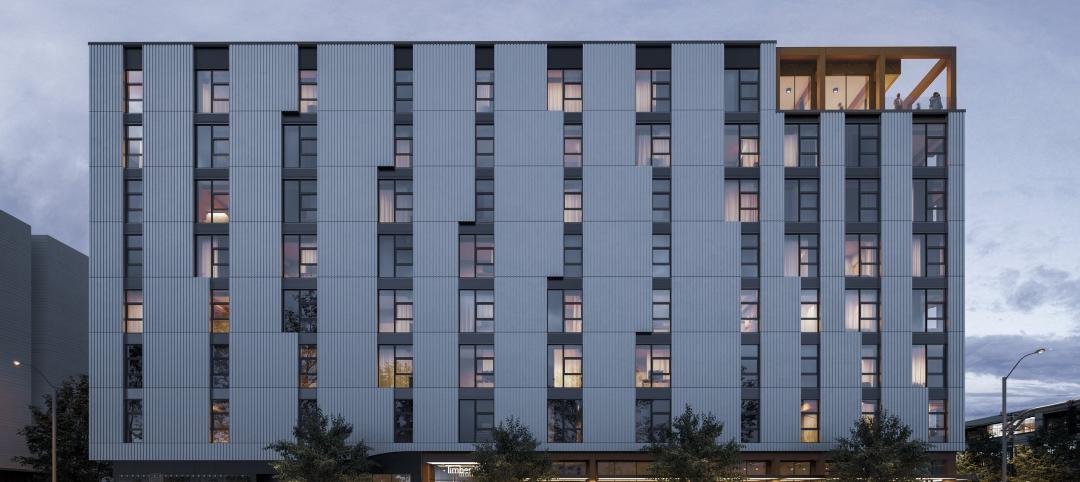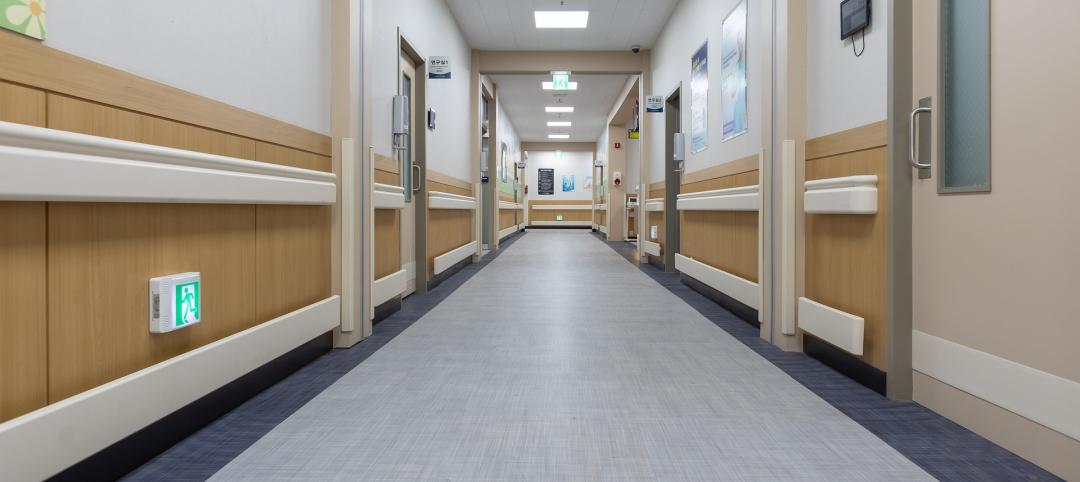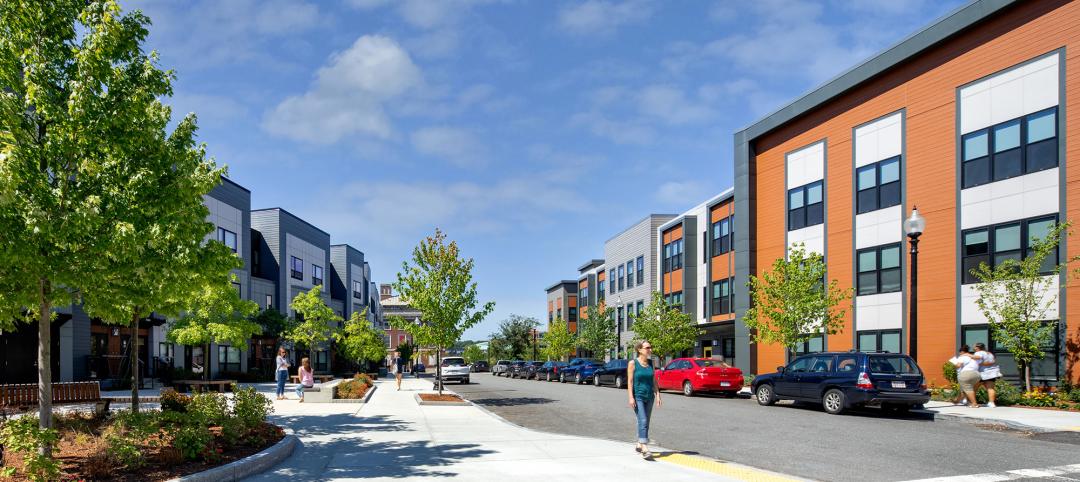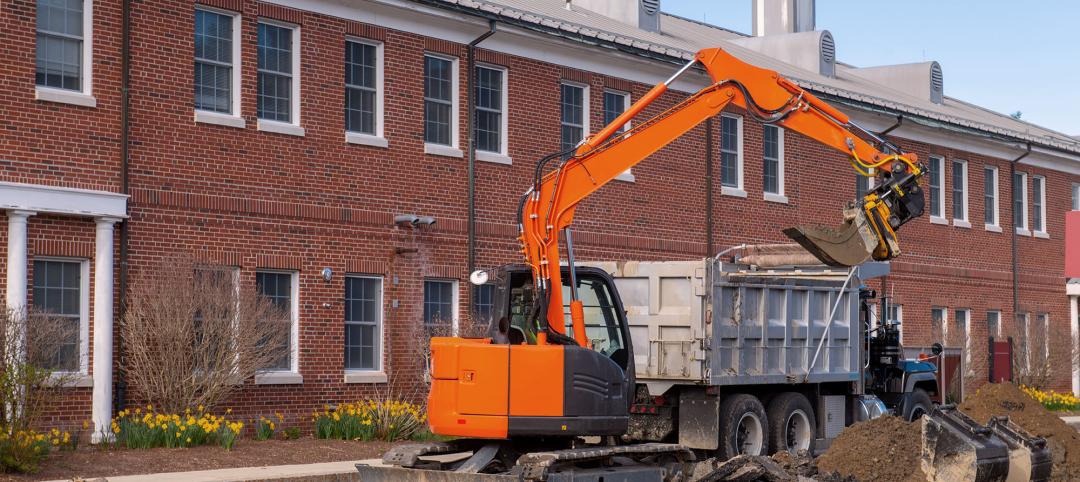Later this year, construction is scheduled to begin on a 115-apartment elder care center for a large healthcare company in Amsterdam, The Netherlands. The project’s developer, REBORN, is working with New Horizon Urban Mining, a demolition firm that specializes in circularity, the practice of deconstructing buildings and infrastructure and selling the building products and components for reuse in new construction.
In this case, the recycled materials come from a 1990s-era Dutch National Bank office building—known locally for its shape as the “cigarette lighter”—that didn’t fit into a planned redevelopment and was torn down. Its remnants—including, prominently, interior glass and plasterboard—will have a second life as parts of other buildings, as will the 14-story tower’s glass façade, which New Horizon removed and loaded onto barges to ship to a warehouse seven miles from the jobsite.
Nearly half of the waste in the Netherlands comes from construction and demolition, yet only a minuscule portion of that waste—around 4%—is reused for residential or nonresidential building. The country, though, has set an ambitious goal to be waste-free by 2050, and Amsterdam itself plans to be building 20% of its new housing with wood and bio-based materials by 2025, and reducing by half its use of raw materials by 2030, according to the New York Times.
Construction and development firms have been debating the efficacy of a circular or regenerative economy for decades. That concept has gotten a lot more attention lately as the construction industry strives to curb the enormous waste it generates—by some estimates, one-quarter of the total waste stream in the U.S. alone—and its carbon footprint that currently accounts for nearly two-fifths of the world’s CO2 emissions.
Michel Baars, who founded New Horizon in 2015, says he introduced the so-called cradle-to-cradle circularity model to the Dutch real estate industry when he co-owned an engineering/inspection consulting firm that was a leader in surveying and management for demolition projects. After selling that company, he recalls, “I realized I wanted to make more of an impact.” He launched New Horizon as a “risk-bearing” company for the demolition of buildings, as well as the production and distribution of building materials from “urban mining.”
Construction materials donations solicited
His 23-employee company generates 15 million Euros (US$15.8 million) in annual revenue. On average, New Horizon demolishes 500 houses and 200,000 sm of commercial buildings such as offices and hospitals per year. New Horizon’s clientele for recycled materials is building owners and developers. When BD+C interviewed Baars by email in November and December, he said his inventory from demolition was “sold out." "Our main goal is scaling up, [so] we need more demolition projects,” he added.
To keep the supply pipeline flowing, Baars says New Horizon offers discounts on the cost of demolition to clients that agree to purchase recycled building products from his company and donate their demo waste to New Horizon. Baars adds, parenthetically, that rarely are clients purchasing the same materials that come from their own demo projects. “We exchange between projects and clients,” he says.
Baars doesn’t believe in owning warehouse space, so he’s worked out deals with big producers and distributors to store New Horizon’s building materials from urban mining in the same warehouses that these companies stock their own products. As the percentage of urban-mined materials becomes larger, New Horizon can more comfortably guarantee full deliveries to contractors, and even offer what Baars calls “hybrid” deliveries that combined urban-mined and newly produced materials.
To demolish buildings in ways that leave materials retrievable and reusable, New Horizon trains its employees and partners itself. An important part of this process, Baars explains, is an analysis of the buildings it plans to demolish so that New Horizon can predict its materials yield. “This is the main guideline for our partners and project leaders,” he says.
That effort is “much easier,” Baars adds, when the building being demolished, such as Dutch National’s office tower, had been constructed using prefabricated components. In fact, Baars founded and co-owns another company called The Middle of Our Street, which produces modular circular social houses. “It is the only winning strategy,” he asserts.
Navigating the building carbon footprint conundrum
Baars is convinced that circularity will make recycled building products more attractive to clients in the future because new production will be more expensive due to carbon taxes. For example, extracting and reusing gypsum from a building’s plaster significantly reduces a project’s carbon footprint because it cuts down on the amount of new gypsum that needs to be manufactured. (Baars says his method of recovery doesn’t crush the plasterboard, so it can be reused in new construction or renovation as wall systems without releasing embodied carbon.)
New Horizon also avoids most CO2 emissions associated with concrete production by reducing chunks of old concrete to a mix that can be separated into cement dust, sand, or gravel. The machines that do this are powered by solar energy, and New Horizon markets the biproduct as climate-neutral.
The company provides 150,000 cubic meters of concrete to the Netherlands’ building industry, and 250,000 tons of other materials that include sand and stone. It is working with Rutte Group, a Dutch company that specializes in circular solutions, to supply concrete for a 300-million-Euro project to repair Amsterdam’s canal walls. The building material is made from recycled content and canal water, and produced onsite.
In the coming years, Baars sees growth for New Horizon Urban Mining coming from its concrete upcycling activities.
“The impact of this materials loop, including the upcycling of ceramic materials, is big enough to make our demolition proposition highly competitive,” he says. And the bigger the scale of his demolition business, the greater the possibilities for urban mining and recycling opportunities in other materials.
Related Stories
University Buildings | May 10, 2024
UNC Chapel Hill’s new medical education building offers seminar rooms and midsize classrooms—and notably, no lecture halls
The University of North Carolina at Chapel Hill has unveiled a new medical education building, Roper Hall. Designed by The S/L/A/M Collaborative (SLAM) and Flad Architects, the UNC School of Medicine’s new building intends to train new generations of physicians through dynamic and active modes of learning.
MFPRO+ News | May 10, 2024
HUD strengthens flood protection rules for new and rebuilt residential buildings
The U.S. Department of Housing and Urban Development (HUD) issued more stringent flood protection requirements for new and rebuilt homes that are developed with, or financed with, federal funds. The rule strengthens standards by increasing elevations and flood-proofing requirements of new properties in areas at risk of flooding.
Government Buildings | May 10, 2024
New federal buildings must be all-electric by 2030
A new Biden Administration rule bans the use of fossil fuels in new federal buildings beginning in 2030. The announcement came despite longstanding opposition to the rule by the natural gas industry.
Mass Timber | May 8, 2024
Portland's Timberview VIII mass timber multifamily development will offer more than 100 affordable units
An eight-story, 72,000-sf mass timber apartment building in Portland, Ore., topped out this winter and will soon offer over 100 affordable units. The structure is the tallest affordable housing mass timber building and the first Type IV-C affordable housing building in the city.
K-12 Schools | May 7, 2024
World's first K-12 school to achieve both LEED for Schools Platinum and WELL Platinum
A new K-12 school in Washington, D.C., is the first school in the world to achieve both LEED for Schools Platinum and WELL Platinum, according to its architect, Perkins Eastman. The John Lewis Elementary School is also the first school in the District of Columbia designed to achieve net-zero energy (NZE).
Healthcare Facilities | May 6, 2024
Hospital construction costs for 2024
Data from Gordian breaks down the average cost per square foot for a three-story hospital across 10 U.S. cities.
MFPRO+ Special Reports | May 6, 2024
Top 10 trends in affordable housing
Among affordable housing developers today, there’s one commonality tying projects together: uncertainty. AEC firms share their latest insights and philosophies on the future of affordable housing in BD+C's 2023 Multifamily Annual Report.
Retail Centers | May 3, 2024
Outside Las Vegas, two unused office buildings will be turned into an open-air retail development
In Henderson, Nev., a city roughly 15 miles southeast of Las Vegas, 100,000 sf of unused office space will be turned into an open-air retail development called The Cliff. The $30 million adaptive reuse development will convert the site’s two office buildings into a destination for retail stores, chef-driven restaurants, and community entertainment.
Codes and Standards | May 3, 2024
New York City considering bill to prevent building collapses
The New York City Council is considering a proposed law with the goal of preventing building collapses. The Billingsley Structural Integrity Act is a response to the collapse of 1915 Billingsley Terrace in the Bronx last December.
Student Housing | May 3, 2024
Student housing construction dips in the first quarter of 2024
Investment in college dorms dipped slightly in the first quarter of 2024, but remains higher than a year ago.


